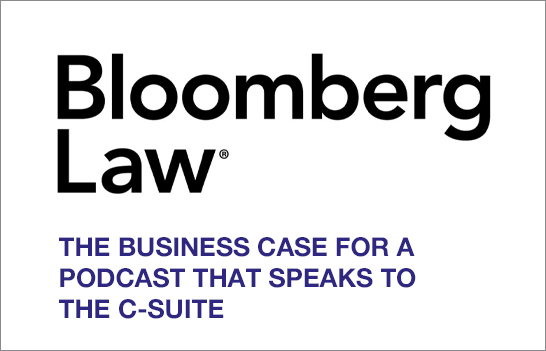The Business Case for a Podcast That Speaks to the C-Suite
This article was originally published by Bloomberg Law on December 16, 2020.
As podcasting skyrockets in popularity in the U.S., legal-themed podcasts present a largely untapped opportunity for lawyers seeking a competitive edge in their marketing efforts.
As of November, there are more than 1 million active podcasts, comprising over 30 million episodes, and 49% of U.S. consumers report listening to them at home with smartphones as the top medium for podcast consumption. The average podcast listener consumes seven different shows per week and is more active on every social media channel than non-listeners, boosting the likelihood that engagement will result in message amplification.
Specific to the legal industry, in-house counsel and C-suite executives have ranked podcasts as a preferred content source in recent surveys. In a survey of 150 private practice attorneys, none of the respondents had launched their own podcast, and only about 10% identified that they planned to do so within the next six months.
As a result, podcasts are a high-engagement, low-competition way for law firms, practice groups and attorneys to extend their reach through thought leadership.
How to Know if a Podcast Is Right for Business Development
Before committing to podcasting, it is essential to go to the heart of your firm’s core values and purpose to determine how you can relate that to content, and the next step is determining the business case.
Key considerations for determining whether a podcast will support your business development and thought leadership include:
- Does it align with your overall content marketing objectives? In the pandemic-altered business landscape, budgets have shifted and best-laid plans may have been thrown off track. This is an ideal time for your firm to re-evaluate goals by looking at your marketing plan and your firm’s business strategy. If you don’t have a content marketing strategy or a marketing plan, now is the time to start and evaluate how multimedia opportunities could integrate within your current ad hoc efforts and support advancing your firm.
- What does your firm or practice group have to offer? Based on your firm’s offerings and individual lawyers’ strengths, you may decide to produce a firmwide podcast that features lawyers from each practice or programming specific to one practice or industry group. For practice-specific podcasts, combining valuable, targeted information with engaging attorneys can then elevate and extend the firm’s reach.
- Is there a market for your content and a viable audience? Think about the audience you want to target, and then determine whether you can produce content that they will find useful and compelling. Conduct research to determine the level of competition, if any, in that particular area of law or industry.
- Do you have the resources and bandwidth to execute? Before launch, you must ensure that a core team of lawyers is committed, has time to dedicate, and the budget necessary to properly promote the podcast.
- Is there buy-in? Will the firm invest in the initiative?
Preparing for Success
The first step is to finalize a full go-to-market strategy. This strategy should tie into the overall firm or practice marketing and business development plan, and it should be data-driven. Develop example key performance indicators (also known as KPIs) that track return on investment.
Then, prepare a budget. You can launch a high-quality podcast with as little as few hundred dollars and sustain it with a few hundred dollars a month. With minimal effort in-house or the assistance of a turn-key podcasting service, you can be up and running in less than a month.
Third, communicate the value within your law firm by positioning podcasting as a low-investment, high-value opportunity for business development. When you think about it, a podcast is nothing more than an audio file that is uploaded to the internet for public consumption.
Curating Content That Resonates
Every episode you produce is a business development tool and a referral opportunity, so high-quality, compelling content is the goal. Prospective guests on your podcast must feel good about participating, and they should feel proud to share the episode with their professional networks. Encourage your guests to co-market and promote their episodes through their social channels to amplify your show’s reach and exposure to potential new listeners.
Engaging podcast content can be repurposed for other marketing channels, including blog posts and videos, to showcase thought leadership. Publishing the show’s notes on your website and on your podcast landing page benefits search-engine optimization and provides additional ways for prospective listeners to find you.
Metrics will also inform your content decisions. Number of listens and downloads are the most important metrics to track. You may also want to track number of listens and downloads month over month, as well as the number of subscribers, website traffic, and relationships to referral partners. But be flexible: Your KPIs may change over time, and you may find that there is success you did not previously consider that supports the continuation of the podcast.
As you consider the preferred episode format and length for your podcast, keep in mind that the sweet spot for listeners is eight to 30 minutes.
With thoughtful planning and execution, a law firm can create compelling, entertaining and educational content that meets the needs and wants of its target audiences.
Reproduced with permission from Copyright 2020 The Bureau of National Affairs, Inc. (800-372-1033) www.bloombergindustry.com.


